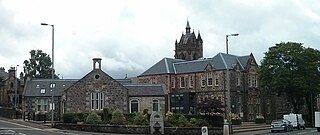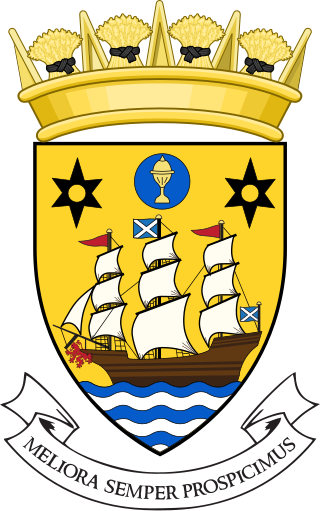
North Ayrshire is one of 32 council areas in Scotland. The council area borders Inverclyde to the north, Renfrewshire and East Renfrewshire to the northeast, and East Ayrshire and South Ayrshire to the east and south respectively. The local authority is North Ayrshire Council, formed in 1996 with the same boundaries as the district of Cunninghame which existed from 1975 to 1996.

Inverclyde is one of 32 council areas used for local government in Scotland. Together with the East Renfrewshire and Renfrewshire council areas, Inverclyde forms part of the historic county of Renfrewshire, which currently exists as a registration county and lieutenancy area. Inverclyde is located in the west central Lowlands. It borders the North Ayrshire and Renfrewshire council areas, and is otherwise surrounded by the Firth of Clyde.

Renfrewshire is one of the 32 council areas of Scotland.

Shona McRory Robison is a Scottish politician who has served as Cabinet Secretary for Finance and Local Government since 2023. A member of the Scottish National Party (SNP), she previously served as Deputy First Minister of Scotland from 2023 to 2024. Robison has been the Member of the Scottish Parliament (MSP) for Dundee City East since 2003 and was an additional member for the North East Scotland region from 1999 to 2003.

Inverclyde was a parliamentary constituency of the House of Commons of the Parliament of the United Kingdom. It replaced Greenock and Inverclyde and the Port Glasgow and Kilmacolm areas from West Renfrewshire for the 2005 general election.

Kilmacolm is a village and civil parish in the Inverclyde council area, and the historic county of Renfrewshire in the west central Lowlands of Scotland. It lies on the northern slope of the Gryffe Valley, 7+1⁄2 miles southeast of Greenock and around 15 miles (24 km) west of the city of Glasgow. The village has a population of around 4,000 and is part of a wider civil parish which covers a large rural hinterland of 15,000 hectares containing within it the smaller settlement of Quarrier's Village, originally established as a 19th-century residential orphans' home.

Renfrewshire or the County of Renfrew is a historic county, registration county and lieutenancy area in the west central Lowlands of Scotland. The lieutenancy area covers the three modern council areas of Inverclyde, Renfrewshire and East Renfrewshire, and this area is occasionally termed Greater Renfrewshire to distinguish it from the modern council area called Renfrewshire. The historic county additionally included territory on the south-western edge of Glasgow which was gradually transferred to the administrative area of the city as it grew.

Inverclyde Council is one of the 32 local authorities of Scotland, covering the Inverclyde council area. In its current form the council was created in 1996, replacing the previous Inverclyde District Council which existed from 1975 to 1996.

Dumbarton is a constituency of the Scottish Parliament (Holyrood) covering parts of the council areas of Argyll and Bute and West Dunbartonshire. It elects one Member of the Scottish Parliament (MSP) by the first past the post method of election. It is also one of ten constituencies in the West Scotland electoral region, which elects seven additional members, in addition to the ten constituency MSPs, to produce a form of proportional representation for the region as a whole.

Greenock and Inverclyde is a constituency of the Scottish Parliament (Holyrood) covering most of the council area of Inverclyde. It elects one Member of the Scottish Parliament (MSP) by the first past the post method of election. It is also one of ten constituencies in the West Scotland electoral region, which elects seven additional members, in addition to the ten constituency MSPs, to produce a form of proportional representation for the region as a whole.

West Renfrewshire was a constituency of the Scottish Parliament (Holyrood). It elected one Member of the Scottish Parliament (MSP) by the first past the post method of election. Also, however, it was one of nine constituencies in the West of Scotland electoral region, which elected seven additional members, in addition to nine constituency MSPs, to produce a form of proportional representation for the region as a whole.
Greenock and Port Glasgow was a burgh constituency of the House of Commons of the Parliament of the United Kingdom from 1974 until 1997, electing one Member of Parliament (MP) by the first past the post system of election.
Elections to Inverclyde Council were held on 3 May 2007 the same day as the Scottish Parliament general election. The election was the first one using six new wards created as a result of the Local Governance (Scotland) Act 2004; each ward will elect three or four councillors using the single transferable vote system, a form of proportional representation. The new wards replace 20 single-member wards which used the plurality system of election.

Renfrewshire North and West is a constituency of the Scottish Parliament (Holyrood). It elects one Member of the Scottish Parliament (MSP) by the first past the post method of election. It is one of ten constituencies in the West Scotland electoral region, which elects seven additional members, in addition to ten constituency MSPs, to produce a form of proportional representation for the region as a whole.
On 30 June 2011, a by-election was held for the UK House of Commons constituency of Inverclyde. It was triggered by the death of the incumbent Labour MP, David Cairns on 9 May 2011 of acute pancreatitis.
Elections to Inverclyde Council were held on 3 May 2012, the same day as the other 31 local authorities in Scotland. The election used the six wards created as a result of the Local Governance (Scotland) Act 2004, with each ward electing three or four Councillors using the single transferable vote system form of proportional representation, with 20 Councillors being elected in total.
Elections to Inverclyde Council were held on 1 May 2003, the same day as other Scottish Local Government elections and the Scottish Parliament Election.
Elections to Inverclyde Council were held on 6 May 1999, the same day as other Scottish Local Government elections and the first Scottish Parliament Election.

Renfrewshire is one of the 32 council areas of Scotland, formally established in 1996 to succeed the Renfrew district within the Strathclyde region, both of which were abolished; the headquarters are at Paisley.
The 2022 Inverclyde Council elections took place on 5 May 2022, as part of the 2022 Scottish local elections on the same day as the 31 other Scottish local authorities were up for election. The election used the 7 wards created under the Local Governance (Scotland) Act 2004, last changed in 2017, with 22 councillors being elected. Each ward elected either 3 or 4 members, using the STV electoral system.












